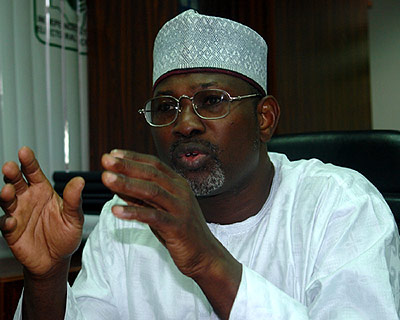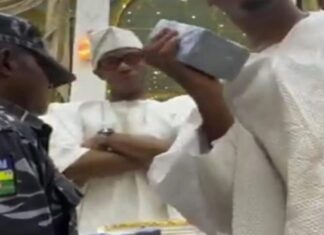Hitches in voters’ registration are producing anxiety among Nigerians that the Independent National Electoral Commission (INEC) is yet to get its act together for the elections next year, even as political parties are already waiting in the wings.
Prof Attahiru Jega, INEC chairman.
The INEC says, however, that there is no cause for alarm.
Kayode Idowu, spokesman for INEC Chairman, Attahiru Jega, told TheNiche that to avoid cumbersomeness, the exercise is being conducted in three phases with the first already concluded.
He explained that the exercise was meant for only those who did not register before the 2011 elections and those who have newly turned 18 years.
“We have enough machines but they are deployed in accordance with actual manpower available.
“The commission designed a programme that is cost effective. If more people come out to register, the INEC will make adequate provision to accommodate them within the period allocated for the exercise,” he said.
Jega seeks more funds
Jega himself confirmed that the INEC is doing its best to avoid the mistakes of the past but is being handicapped by insufficient funds.
He told a forum organised by the House of Representatives Committee on Reform of Government Institutions in Abuja that the challenges include “funding, insecurity, attitude of the political class” and an “apathetic and inactive citizenry.”
He also cited the delay in amending the legal framework, completion of the review of electoral constituencies and polling units and prosecution of election offenders.
“In 2012 and 2013, the funding declined. There are funding gaps to do the 2015 elections. Ideally, when we say the INEC is independent, we should do everything possible to make it really independent,” Jega said.
The last election in 2011 cost N122.9 billion.
Even with inadequate funding for the 2015 vote, the INEC says it is fully prepared and is conducting an awareness campaign, which includes placing advertisements in the media.
But other Nigerians think otherwise.Investigation showed that there is anxiety over how the INEC is carrying out the exercise.
Enugu Speaker requests cancellation
In Enugu, one of the states in the first phase, there were complaints of inadequacies, despite the public holiday declared by the state government for the registration between May 28 and 30, which wound up on Sunday, June 1.
Igbo-Etiti and Nsukka councils were worst hit.
Apart from logistics, there was a shortage of direct data capture (DDC) machines, the most vital equipment after personnel.
Enugu State House of Assembly Speaker, Eugene Odo, called on the INEC to cancel the exercise and start afresh.
Said he: “We have lodged a complaint with the EO (electoral officer) but he appears helpless. I have complained to the REC (resident electoral commissioner) but he is not forthcoming with a solution.
“So, what we are asking is that this exercise should be cancelled and the INEC should go back to the drawing board.
“Nothing is happening in Igbo-Etiti. I have not been able to register, even when the INEC has not justified why our name disappeared from the list. What the INEC is doing in Igbo-Etiti is a sham, the INEC is not serious.
“It is also quite shocking for the EO to say that everything is working well, it is the height of insincerity.”
Only two DDC machines were available at Michael Okpara Square where over 500 persons went to register.
Enugu North council Chairman, Emeka Edeh, who monitored the exercise, expressed concern that many people could be disenfranchised.
Another participant, Angus Chukwu, complained that “for three days the exercise has been on in Enugu State, not up to 1,000 people have been registered.
“Out of the over 160 wards in the state, the INEC sent fewer than 100 DDC machines, deploying only one to each ward. This is grossly inadequate.”
Chukwu asked for the registration to be extended for another seven days.
The state Peoples Democratic Party (PDP) also condemned the exercise, describing it as a monologue.
A statement issued by Enugu East Senatorial District Youth leader, Tony Nwachukwu, said there was apathy because of the frustration voters went through.
He urged the INEC to improve the registration to capture the majority of the voters and restore confidence to the electoral process.
Minor hiccups in Abia
However, in Abia State, registration went fairly well with minor hiccups.
Governor Theodore Orji applauded the exercise but advised the INEC to close the loopholes.
Orji gave an assurance after obtaining his voter’s card that the state will support the INEC to conduct a credible ballot.
But he counselled that “the disappearance of some voting units which existed before” as well as “asking villagers to take passports before they could be issued with permanent voter’s card should be discouraged.”
Osun registers few
There were loads of complaints in Osun State where many eligible voters claimed they could not be registered.
The problems included shortage and malfunctioning DDC machines.
TheNiche reported on May 18 that the stolen batteries of the DDC machines are being sold in open markets in Nigeria and Benin Republic, which may have contributed to the shoddiness of the exercise.
But Idowu insisted that the first phase of the registration has been concluded in 10 states, the second phase kick offs with distribution of permanent voter’s cards between July 18 and 20, and the third between July 23 and 27.
“We are doing the registration in phases. We are through with the first phase and we have two more phases. We will start the second phase in July and that will involve 11 states and the Federal Capital Territory (FCT).
“After that we will move over to the third phase,” he explained.
The 11 states in the second phase are Yobe, Bauchi, Jigawa, Sokoto, Ondo, Delta, Cross River, FCT, Kwara, Anambra, Ebonyi and Oyo.
States in the third phase are Adamawa, Kaduna, Katsina, Kano, Borno, Plateau, Nasarawa, Niger, Imo, Lagos, Ogun, Edo and Rivers.
Asked about apathy caused by low awareness, Idowu countered: “We have done a lot of awareness. Some states even declared public holidays because of the exercise. What level of awareness or education is more than that?”
Little awareness in Lagos
Lagos, the most cosmopolitan state in Nigeria, is included in the third phase but there is little preparation in terms of awareness and political education.
Regardless, Lagos INEC Public Relations Officer, Femi Akinbiyi, told TheNiche that the state does not anticipate any problem.
“We have enough DDC machines for the exercise and we are going to use designated areas. We are well prepared for the exercise,” he assured.
On sensitisation and political education, Akinbiyi maintained that the INEC has done its bit and also held meetings with political parties to tell them how to prepare for the exercise.
Akinbiyi did not disclose the number of DDC machines deployed in Lagos State for the excercise.
Meanwhile, Voters’ Awareness Initiative (VAI), a non-governmental organisation for political education in the country, plans awareness campaign in August, six months to the election.
The campaign will cut across all strata of society and involve the media, street shows as well as town hall meetings, according to VAI President, Wale Ogunade.
He advised the electorate to understand what is expected of them and to ensure their votes count.
He urged Nigerians to join the push to ensure a better Nigeria and to free it from the claws of a political class that is self-centred and unwilling to quit the stage.













